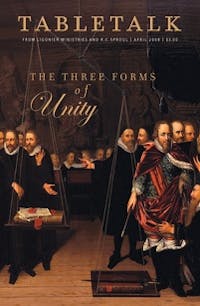
Request your free, three-month trial to Tabletalk magazine. You’ll receive the print issue monthly and gain immediate digital access to decades of archives. This trial is risk-free. No credit card required.
Try Tabletalk NowAlready receive Tabletalk magazine every month?
Verify your email address to gain unlimited access.
While written creeds have their advantages, unwritten creeds have a few as well. With a written creed we are able to nail down precise language. We can affirm this and deny that. Everyone is able to make a conscious decision about whether or not they agree. This, in turn, mirrors at least one of the benefits of an unwritten creed. First, it leaves more wiggle room. Second, if the creed is unwritten, there is no place to sign on the dotted line. If there is no list of signatories, it’s so much easier to simply assume that everyone is on board. It’s not an easy thing to deny a creed that hasn’t really been written.
Sociologists and historians often wrangle over exactly what it means to be American. In a debate reminiscent of psychologists arguing the old nature versus nurture conundrum, these scholars dicker over whether American culture is defined by kinship or ideology. Are we Americans because our ancestors came mostly from western Europe, or are we Americans because we hold these truths to be self-evident, that all men are created equal? Is our corporate identity the result of genetic history, or the history of ideas? Is it un-American to dislike baseball, hot dogs, apple pie, and Chevrolet, or is it un-American to hail from Mexico?
Whichever side one takes, we all have to share this creed, to make this confession — that there is now, and has always been, a series of unwritten commitments we are supposed to share as Americans. Even if we think that to be American is to be anglo, we still have to confess the reality of these unwritten creeds. These may and probably will change over time (another “benefit” of having them unwritten), but they are there nonetheless. Just as with theological creeds, these creeds serve to bring unity out of diversity. In our day, however, we are unified by a creed that of necessity divides us.
The central pillar of faith for our culture, that form of unity that forms our unity is simply this: there is no such thing as true and false. This is the creed of our culture, the one, unspoken unifying principle to which everyone is expected to submit. Trouble is, this unifying creed cannot unify. It is, by its very nature, divisive. Whereas historical creeds, like the Three Forms of Unity, exist to say, “Here is where you and I agree” our modern, or, rather, postmodern American creed affirms, “You and I cannot agree, and even if we did, it wouldn’t really mean anything.” Our creed affirms that we each have our own truth, that we each create our own little world, that we are each locked into a solipsistic cage.
Our creed also suffers from this obvious weakness: it is patently and immediately false. We are united around a creed that cannot even stand on its own weight. Our creed, if it is true, is false. And if it is false, it is false. Which tells us it is false. That is, if it is true that there is no such thing as true and false, then we cannot say that it is true that there is no such thing as true and false. This absurdity may have some entertainment value to us, but keep in mind, this quicksand is the very pillar and foundation of our culture. Suddenly, it’s not so funny.
A greater irony than the absurdity of the creed, however, is the fanaticism of its adherents. It did not become our national creed by a slow and steady winning of adherents. Instead, we have a culture that shrilly demands that all men everywhere bow before this principle, that we all bend our knee and confess with our tongue that there is no such thing as truth. If we don’t, we must be, figuratively, at least for now, crucified.
Our first creed, long before we embrace the Three Forms of Unity, or the Westminster Standards, or even the Apostles’ or Nicene Creeds, is the first creed of the church: “Jesus is Lord.” This Jesus is not a truth. He is not true for me. He is instead the truth. This confession of ours, even as it ran headlong into the creed of Rome, “Caesar is Lord,” runs headlong into the great American Creed. Because we confess that Jesus is Lord, we cannot confess that there is no such thing as truth. This, in turn, is why we evangelicals are finding ourselves more and more compared to the Taliban. This is why Islamic fundamentalism looks to the watching world to be the same thing as evangelical fundamentalism. For now they are content to disparage our character, to paint us in the public eye not merely as unsophisticated rubes, but as dangerous foaming-mouthed fanatics.
And so we should be. Our calling in this context isn’t to negotiate. We ought not labor to show the watching world how reasonable we can be, when reasonable is defined as embracing their creed. Our calling instead is to stand upon the rock, to stand firm and confess our creed with all the greater vigor. Let them despise us for not joining in their “unity.” Let us instead be united to the one who told us to be not surprised when we are hated for His name’s sake. Let us instead seek His kingdom and His righteousness. Let us confess His name before all men, that He might confess our name before His Father.
